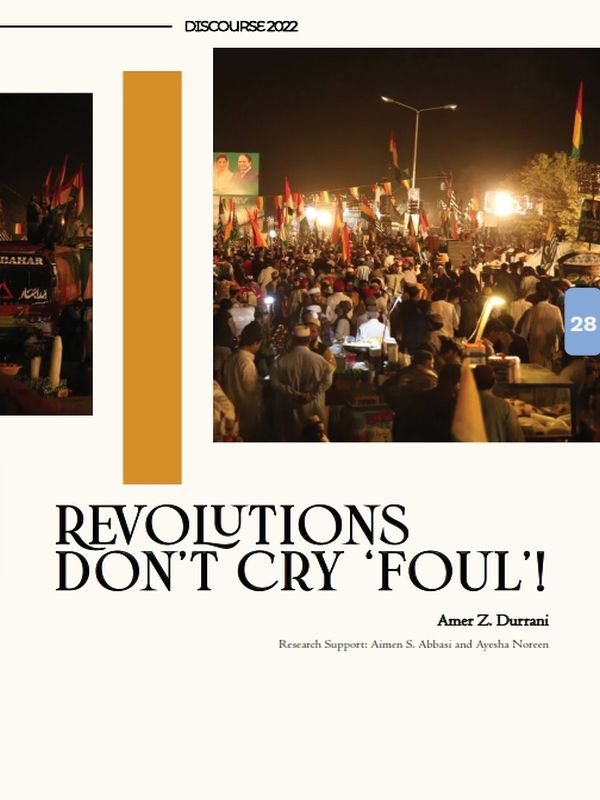
Pakistan Institute of Development Economics
- Home
Our Portals
MenuMenuMenuMenuMenuMenuMenu - ResearchMenuMenuMenuMenuMenuMenuMenu
- Discourse
- The PDR
- Our Researchers
- Academics
- Degree Verification
- Thesis Portal
- Our Portals
Revolutions Don’t Cry ‘Foul’!
Research Support: Aimen S. Abbasi and Ayesha Noreen
“Everything is a risk in Pakistan. If you defend women, it’s a risk. If you defend non-Muslims, it is a risk. If you discuss religion, it is a risk. But you cannot really sit there like a vegetable in your own society. And I am committed to that society … and I feel I need to turn around and speak as I should.” – Asma Jahangir
Truer words were never spoken by a revolutionary. Did Asma express this for winning a seat in the legislature or as a harbinger to a revolution? I believe it was the later.
What we see around us in Pakistan today is more a political jostling for getting a seat in the legislature, for whatever it is worth—and it is worth much, though not for the people of Pakistan rather for the jostlers. Be it the heart wrenching portrayal of a father and daughter’s sacrifice or the diatribe on corruption, family politics, and Madina-ki-Riyasat, it is all emotional black mail. What else does one expect in a sham democracy enslaved by political feudal lords and ladies jostling for a day in the legislature—Pakistan be damned, as it goes.
As one friend put it succinctly, Pakistani democracy is where the sheep—us common folk—get up in the morning and vote for the best wolf they want to be eaten by!
Fooling common folk with slogans of country and religion in the name of saving a nation—Pakistan—is where jostling for legislature is mashed in the cream of revolution. How convenient! Revolutions don’t go running to the courts for vindication.
Revolutions and election campaigns are oceans apart. Yes, even the ‘getting a two-third majority’ kind of campaigns—this just means more sheep coerced to vote for being eaten by a ‘popular’ wolf! Campaigns must follow rules, revolutions create their own rules.
With all ensuing amendments, the Article 16 of the 1973 Constitution of Pakistan grants every citizen—popularly known as sheep—the right “to assemble peacefully and without arms, subject to any reasonable restrictions imposed by law in the interest of public order”. Well, the dear Constitution, when framed, did not cater for a wolf interior minister—pre-arrest pardon sought!
Further interpretations, including collective ones with Article 17, especially on the term “public order”, are aplenty, starting with Abdul Hameed Qadri versus S.D.M. Lahore, Shukar Din versus Government of West Pakistan and others agreeing on the following. Public interest is the perception of action that property, human life, and safety and public tranquility are in danger. Note that tranquility is not the way one would describe the daily life of us common folk in Pakistan. Then comes our dear judge of Islamabad High Court adjudicating that a peaceful protest staged by unarmed persons is a constitutionally protected right. I agree.
All, us less-than-tranquil sheep, should be allowed to vent. The right to protest is not an absolute right in a nation state, it is subject to conditions. Add to this, the Islamabad High Court declaring, in 2022, “Power to issue order absolute at once in urgent cases of nuisance or apprehended danger” cannot be exercised in derogation to the fundamental rights guaranteed under the Constitution. This is getting confusing.
Let us clear the confusion. Is the state supreme? What I write next is with an advance apology to the feelings of all agnostics and non-creationists friends reading this—well, also to the pulpit devils in this God given country of Pakistan—recall, I am a self-proclaimed sheep and did not call the pulpit devils friends.
In a nation state as we know since the 19th century, the state is supreme. God’s ordains are personal and societal or communal—very often, yes, the emphasis is on very, are they state based. If you deny this basic premise, the state ceases to exist. Such was the Madina-ki-Riyasat. This is up for debate but not for browbeating.
The world is already God’s kingdom—per Islamic belief system—not any, one person’s diktat! What is the fight about, then? It is about Siyasat-e-Madina and not about Riayasat-e-Madina. The Siyasat-e-Madina was all about pragmatic and rule-based governance based on a evolving code that was demonstrated. One can write volumes, but the gist is that there was no jostling involved nor was it a greed for power. It was a revolution to re-jig the collective human existence principles.
If politics is the art and science of governance, then the state or the ‘riayasat’ is what is governed based on the constitution of the state. Politics is not a revolution. Laws of the state will apply on all jostling for a seat in the legislature of Pakistan! Riyasat-e-Madina was built on character—that of the unassailable Muhammad (MPBUH)—and not on hooliganism.
Revolutions, my friends, do not cry on the shoulders of the courts and burnish the military, but jostlers for power and Pakistan’s legislature do!
The author is the President of Reenergia and a former World Banker



